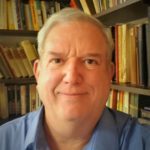By Curt Collier

When I was in the fourth grade, my family moved with my Dad’s job from Victoria, Texas, to Hondo. Hondo (population then of 4,500 people) was mostly a ranching community cut in half by the railroad tracks. The town’s claim to fame is a highway sign sitting beside the tracks. People travel from all over just to snap a picture in front of it. The green sign with white wooden letters (some frequently missing) pronounced the following: THIS IS GOD’S COUNTRY PLEASE DON’T DRIVE THROUGH IT LIKE HELL.

It was dry and rocky, a far cry from the Texas Gulf Coast, and a heavily segregated community. This division was not just between Anglos and Hispanics, but between the wealthier families, all connected by marriage, and the poor side of town. We lived on the poor side of town in a trailer park not far from where my father worked, and we weren’t related to anyone. You can guess how the community viewed us.
Never liked it, except for one person
Occasionally these divisions would spill over into protests. I remember the day that organizers from the La Raza Unida Party surrounded our school, calling on bullhorns for youth to walk out of their classrooms. Needless to say, a tense time followed for months. The school we attended, McDowell Middle School, had been recently built, and at that time sat in a patch of dirt surrounded by recently planted live oaks. It was Spanish by design, with a terracotta fountain in the middle, and the classrooms all opened to the courtyard, typical of schools in that area. The school’s architecture aside, I never liked it there, except for one person.
Betty Hay was a tall woman with a loud laugh, a booming voice, and big hair to match. (My mom was her beautician and responsible for that). She was also my sixth-grade science teacher. When I entered Mrs. Hay’s classroom, I felt I had been transported to a far cooler place. She had science posters, lab equipment, and something that gave it an extra jolt—enthusiasm. I remember her talking excitedly about science topics that captured my fascination. While it wasn’t until my master’s degree that I pursued science, I attribute my continued love for the subject to her. Early experiences can shape us in ways we don’t realize until years to come.
Environmental science for young adults
The Ethical Society is announcing two new programs directed toward young adults. The first is a community science project supported by the NY/NJ Hudson Estuary Program of the Hudson River Foundation. The Society’s members will be constructing eel “mops,” which are densely packed synthetic fibers that mimic aquatic plants. Tiny eels frequently hide in such places on their journey upstream. Each week our youth will check these mops, placed nearby in the Hackensack River, and count the baby eels they find.
Eels are both a “keystone” and an “indicator” species, which means they play a central role in the ecosystem of East Coast rivers and streams. They also give you an indication of a river’s health, because baby eels don’t thrive in polluted waters. If we find eels, we can then show that the Hackensack River is making further recovery. I found this grant enticing, because eels are creepy to many, who don’t like their snake-like appearance. They’re really just elongated fish, and I believe our youth will love finding them and supplying important data to the Hudson River Foundation.
Comedy helps the science stick
Our second project is the Great New Jersey Science Show. The show’s focus is using sketch comedy (think Saturday Night Live) to tackle science information in a relaxed, silly environment. These “informal science learning environments” have been shown to increase scientific literacy and entice students into science careers. Our first show is at 8 pm on Saturday March 25. Although the show is geared toward a high-school crowd, it is open to all. We’re looking for lots of volunteers to support this project. We’re happy to share that Blue Foundry Charitable Foundation gave us a grant of $4,500 for this project, which was supplemented by $1,500 from the Puffin Foundation.
Latinas in the lab
On March 19, we will be bringing in two Latina scientists, young women who navigated complex cultural and social barriers to build careers in science. Both of these speakers are from immigrant families and have much to share. We are hoping to use that Sunday morning also as a celebration of all the women in our Society who have pursued careers in science and health, so please plan on showing up and applauding with us.
Regardless of what field you ended up pursuing, no doubt the enthusiasm of others played a role in shaping that path. Youth today will need a far greater level of scientific literacy than was required of us. They will need all the tools of STEAM (science, technology, engineering, arts, and math) to reimagine a new economy and skills to communicate that vision to others. Let’s bring our enthusiasm for these same topics to encourage our youth and foster the commitment and skills they will need to help protect and preserve our planet.
Curt Collier is leader of the Ethical Culture Society of Bergen County.


